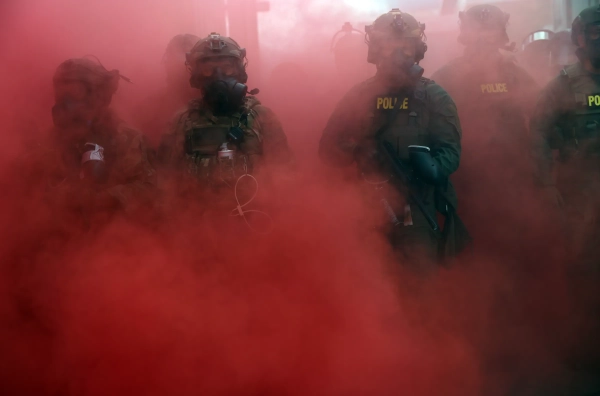
Banks say they’re helping federal workers missing pay during the partial government shutdown, but exactly what they’re doing, in many cases, is unclear. Sen. Elizabeth Warren (D-MA) is pushing for more details.
The Massachusetts Democrat and 2020 presidential contender sent letters to Bank of America, Citigroup, JPMorgan Chase, US Bancorp, and Wells Fargo on Tuesday, asking them for details on the actual services and solutions they are offering to federal workers who are furloughed or aren’t being paid because of the shutdown, contractors and their employees who have been affected, and private businesses that may have been hurt. She is also asking how many people and businesses the banks have actually helped, and what plans they have as the shutdown — the longest in US history — goes on.
While the banks have said that they plan to do something to help workers harmed by the shutdown, in many circumstances, their plans have been pretty light on details.
Join the Vox Video Lab
Go behind the scenes. Chat with creators. Support Vox video. Become a member of the Vox Video Lab on YouTube today. (Heads up: You might be asked to sign in to Google first.)
Chase, for example, is automatically waiving or refunding overdraft monthly service fees for employees with direct deposits set up, but in other instances — mortgages, credit cards, and car loans — it’s only publicly telling clients to call to figure out what the bank can do.
Wells Fargo set up a website for “customers who are experiencing hardship” because of the shutdown and promised to “work with” clients to identify their options. On Tuesday, the same day Warren’s letter was sent, it announced it would give $250,000 to United Way Worldwide for the creation of a coalition to help workers affected by the shutdown and laid out more details of its services, including reversing direct deposit fees and credit card account fees. It says it’s working with customers individually as well.
Citi has said it may consider fee and interest adjustments and, for mortgages, might offer short-term forbearance and repayment plans or loan modifications, and during its fourth quarter earnings call this week, CFO John Gerspach provided some more details about what the bank is doing. A spokesperson said Citi is “closely monitoring the situation.”
Bank of America has a landing page and a phone number for government employees to call. “It’s a case-by-case basis,” Bank of America spokesperson Lawrence Grayson told me last week.
US Bancorp has rolled out perhaps the most specific offer: a new low-rate, quick loan product that lets government employees apply for loans of $100 to $6,000.
Still, Warren says she wants to know more. “I’m glad that you are taking some steps to help your customers but these announcements do not provide full details about the services that are actually available to affected workers and businesses,” she wrote.
Regulators have asked banks to help out
On January 11, federal financial regulators sent a letter to financial institutions encouraging them to work with customers affected by the shutdown. The agencies said that workers were likely facing “temporary hardship” because of the shutdown and said financial institutions should “consider prudent workout arrangements that increase the potential for creditworthy borrowers to meet their obligations,” including extending new credit, waiving fees, and modifying loan terms.
Warren wrote that she agrees with the regulators and specifically applauded credit unions, many of which have been quick to step in with special services for federal employees.
According to CNBC, Launch Federal Credit is offering a 0 percent interest rate for loans of as much as $3,000 to federal employees, and Navy Federal Credit Union is offering them for up to $6,000. The US Employees Credit Union is providing zero-interest loans for 60 days to its members, and Justice Federal Credit Union is offering low interest rate loans to Justice and Homeland Security department employees. Congressional Federal Credit Union is offering no-interest loans for 60 days.
“[S]mall banks and credit unions should not be the only financial services providers assisting federal workers during the shutdown,” Warren wrote.
The shutdown tells a bigger story of how many Americans are living paycheck to paycheck
A number of harrowing stories of federal workers and contractors struggling to make ends meet have come out of the government shutdown. There are people taking on jobs driving for Uber and babysitting to pay their bills, and hundreds of GoFundMe pages have popped up from workers looking for help. One Wisconsin woman has been forced to ration her insulin because she can no longer afford her copay.
Given the size and scope of the group affected — some 800,000 government employees, plus thousands of contractors — the shutdown’s impact is hard to ignore. But more broadly, it highlights how many Americans, including those with supposedly good government jobs, are living paycheck to paycheck.
The majority of American households don’t have a rainy day fund they can dip into in the event of some sort of unexpected financial setback or need. According to the Federal Reserve Board, 40 percent of Americans can’t cover a $400 emergency expense. A 2017 report from the employment website CareerBuilder estimated that nearly 80 percent of American workers live paycheck to paycheck.
The hardships workers are experiencing as a result of the government shutdown speak to a broader scenario many American workers face: Even in a strong economy, and with unemployment historically low, a lot of people aren’t making — or saving — enough for when things go wrong.
Warren’s letters, in full, are below:
Sourse: vox.com






